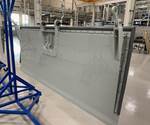Spirit AeroSystems receives $80 million Defense Production Act Title III funding
The funding, in national response to COVID-19, will support and expand Spirit’s production capabilities for composites and metallic fabrication.

Source | Getty Images
Spirit AeroSystems (Wichita, Kan., U.S.), manufacturer of composite and metallic structures for commercial and defense sectors, announced on June 11 that the Department of Defense (DoD) allocated $80 million to Spirit to expand domestic production capability for advanced tooling, composites fabrication and metallic fabrication. Supporting a number of military programs, including programs for the U.S. Air Force, the U.S. Navy, the U.S. Marine Corps and the U.S. Army, Spirit says these funds are part of the national response to COVID-19 in support of the defense industrial base (DIB), and are authorized and appropriated under the CARES Act.
"We appreciate the confidence our customers have in Spirit's capabilities to serve a variety of critical defense needs," says Duane Hawkins, senior vice president of defense and fabrication at Spirit AeroSystems. "Our growing work on defense programs has provided a measure of stability for the company and helped us as we shift capacity to serve other needs, particularly in the defense market. These funds under Title III will help retain employees with critical skills."
Spirit says it will use the funds to build tooling, fabricate composite parts and machine complex metallic parts at its Wichita facility. The 12 million-square-foot space typically focuses on large, complex, soft metal and composite parts for fuselage, pylon and wing structures.
Related Content
-
Industrializing additive manufacturing in the defense/aerospace sector
GA-ASI demonstrates a path forward for the use of additive technologies for composite tooling, flight-qualified parts.
-
Plant tour: Renegade Materials Corp., Miamisburg, Ohio, U.S.
Renegade Materials is known for high-performance prepregs for aerospace applications. Following its acquisition by Teijin in 2019, the company has expanded capacity and R&D efforts on a range of aerospace-targeted materials.
-
Orbital Composites wins AFWERX award for Starfighter drone fleet
Under the TACFI contract, Orbital is implementing the AMCM process to build 3D printed composite multi-mission UAS aircraft, surpassing $10 million in government awards.













